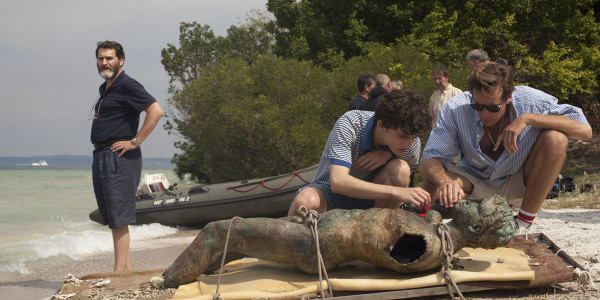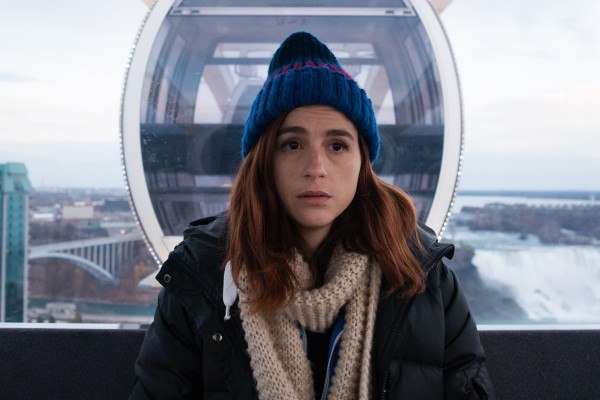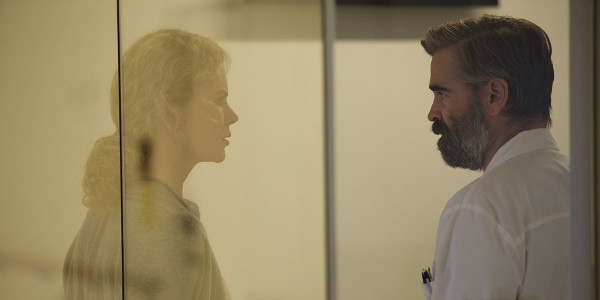
The Toronto International Film Festival has begun.
Let’s bitch it out…Unlike last year’s attempt to do justice to individual (or pairs) of films, this year I’m just going to do snapshot reviews of the films I screened that day. The exception will remain the horror/thriller films; those films will be individually reviews for Bloody Disgusting here.
And so, without further ado here are the three non-horror films I checked out on Day 1.

Call Me By Your Name
This exquisitely beautiful and heartfelt film is equal parts coming of age film and queer romance. Over the course of a hot 1983 summer in Northern Italy, 17 year old Elios (Timothée Chalamet) meets and falls in love with his father’s visiting research assistant, Oliver (Armie Hammer). What begins as a tempestuous semi-rivalry eventually gives way to a passionate, romantic affair that plays out amidst sticky summer days filled with swims in the lake, dinner parties and reading in the grass. Director Luca Guadagnino (I Am Love, A Bigger Splash) fills the screen with warm, slightly desaturated yellows and browns that make the film feel like a hazy vacation reel, populated by male flesh that is provocative, but never exploitative. The undercurrent of male sexuality is hard to ignore; even as the two men are trying to repress their feelings for each other, it pops up in the sensual images and statues in Oliver’s curatorial work with Elios’ father.
Chalamet is a true discovery: he anchors every frame of the film, moving seamlessly between brash and youthful naivety and burgeoning sexual maturity. The fluidity is essential to Call Me By Your Name‘s success and Chalamet’s compelling performance could be a dark horse awards contender. Hammer is solid as the all-American dreamboat; he’s standoffish in the early going on and surprisingly excitable when it is clear that his feelings are being reciprocated. There’s a palpable chemistry between the pair throughout, and by the time that they act upon their attraction in a tasteful moonlit scene, the audience is fully on board with the relationship.
The age difference and Oliver’s impending departure lends the film’s last act a slightly melancholy air. Thankfully there are no dramatics for dramatic sake confrontation with the parents or the tiny Italian community. Instead the relationship ends just as the summer must: with the arrival of cool air and a final phone call to offer closure. In the end Elios is older and wiser, more at ease with who he is; he may no longer be in love, but he’s better for the experience. And so are we.

Mary Goes Round
This Canadian family drama took me by surprise. I was attracted by the presence of actress Aya Cash (of FXX’s You’re The Worst), who stars as Mary, an addictions counsellor who can’t admit that she’s an alcoholic. The first few scenes of the film quickly establish that Mary is not in control of herself and a series of calamities find her without a job, a license or a reason to object when her estranged father Walt (John Ralston) asks her to return to Niagara Falls to meet her half-sister. It is only when she arrives that Mary discovers Walt has lied to both his daughters: not only is Robyn (Sara Waisglass) unaware of her, but Walt is actually dying and needs Mary to help keep the family from falling apart.
Writer / director Molly McGlynn doesn’t stray too far from expectations in how she plots the rest of the family dramatics. The relationship between the half-sisters is predictably chilly and awkward at first, though when Walt’s illness is revealed, the healing power of bonding carries both women through the pain. What helps Mary Goes Round overcome some of its more familiar trappings is the tight control McGlynn wields over the proceedings and the chemistry of the cast. Aya, Waisglass, Ralston and Melanie Nichols-King as Mary’s sole friend/AA sponsor Lou easily convey a bitter, worn-out warmth that helps the jokes (of which there are many) land as well as the pathos. I would be remiss to mention that I may be more susceptible than most to Mary‘s charms as a result of my own father’s recent health issues, but there’s an undeniable power in seeing Mary and Walt exorcise their demons in a race-to-the-bottom shouting match in a hospital ward before reconciling. At times Mary may pander to the heartstrings and wear its none too subtle metaphorical title on its sleeve, but I would argue that’s part of its power.

Killing of a Sacred Deer
When you go into a Yorgos Lanthimos film (Dogtooth, The Lobster), you should know better than to expect something conventional. The Killing of a Sacred Deer proves to be Lanthimos’ most accessible film yet, but unfortunately the film’s audacious logline and A-list cast can’t save it from a languid pace and a bland, drawn-out (anti)climax.
There’s nothing but potential in the premise: Colin Farrell is Steven, a renowned cardiac surgeon with a seemingly perfect nuclear family. Anna (Nicole Kidman) is an optician with her own clinic, daughter Kim (Raffey Cassidy) dominates the choir and writes A+ English essays while younger son Bob (Sunny Suljic) is very talented at piano. All of this is slowly revealed around Steven’s unusual meetings with 16 year old Martin (Barry Keoghan), an odd boy he appears to be mentoring in the wake of Martin’s death. The relationship between doctor and teenager is actually far more complicated than it initially appears and though it’s not quite a SPOILER, I’ll add in a warning regardless. It turns out that Kevin operated on Martin’s father and may have contributed to his death and, after Bob suddenly loses his ability to walk and eat, Martin reveals that Kevin owes him a family member or Anna, Kim and Bob will all die. END SPOILER.
What follows is trademark Lanthimos dialogue (stilted, awkward, unnatural) that helps to reinforce how removed these people are from convention, as well as exquisitely chilly direction (a birds eye shot of Bob collapsing at the bottom of an escalator that’s doubled in a mirror almost made me swoon) makes the film imminently watchable. It is the lethargic pacing that undermines the film. As soon as the conflict between Martin and Steven is revealed, the outcome is laid out and yet it takes another hour and change to move towards the inevitability. There’s never a doubt what it will take to get out of this unusual situation, and yet we are forced to watch endless scenes of Farrell and Kidman bickering and pacing. It’s not compelling, and thanks the Lanthimos’ other stylistic techniques, we don’t particularly care whether any of these characters live or die. The climax is arguably drawn out over forty minutes and it never once reaches a point of shock or tension.
Visually sumptuous, well acted and directed, The Killing of a Sacred Deer nevertheless feels like a bloated wasted effort. A tighter edit and more investment in the stakes would have gone a long way to making this a worthwhile follow up to The Lobster.
————————
What’s in store for Day 2?
- I try to overcome my reluctance to watch Westerns (Part 1) with The Rider
- Matt Damon goes Coen for Clooney in Suburbicon
- We’ll see if the buzz about Tangerine director’s follow-up The Florida Project holds up, and
- I end the day with beautiful ladies Eva Green and Alicia Vikander in Euphoria